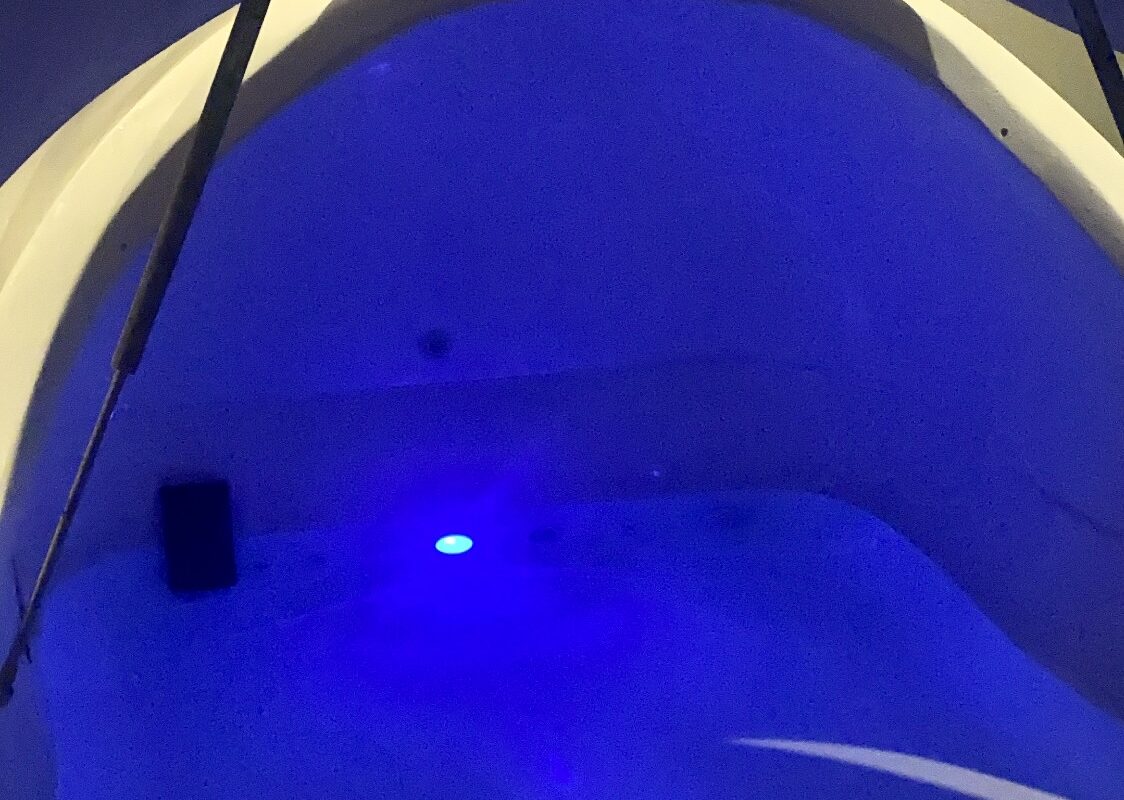 Floatation therapy, also known as REST therapy (restricted environmental stimulation technique), is done in a sensory deprivation tank. Here you’ll float in a ratio of 1:1 salt to water. It’s a dark and soundproof tank, allowing you to disconnect from the world completely. This density of salt allows you to float on your back without worrying about flipping over or drowning.
Floatation therapy, also known as REST therapy (restricted environmental stimulation technique), is done in a sensory deprivation tank. Here you’ll float in a ratio of 1:1 salt to water. It’s a dark and soundproof tank, allowing you to disconnect from the world completely. This density of salt allows you to float on your back without worrying about flipping over or drowning.
The water will be heated to your current body temperature, allowing you to be neither too hot or cold. When you think of it, we spend our first 9 months chilling in the womb. In a way, floating mimics how we spent our first several months as living beings.
Floatation therapy has been proven to produce a myriad of mental and physical wellness benefits. In here, we can detach from the stresses and distractions of everyday life and connect back to ourselves.
Floatation History-
The first floatation tank was designed in 1954 by John C. Lily, a physician and neuroscientist. He wanted to explore the states of human consciousness when removed from external stimuli.
In the 1960’s his experiments turned controversial when he began incorporating hallucinogens like LSD and ketamine. These drugs are not recommended for use in tanks today. Many current studies have been done and have found positive results in users.
Tech Woes-
 Our current technological world is full of constant information and comparisons. We humans have almost forgotten how to be still and relax in the silence of nothingness. Humans have never been constantly consumed with media and technology the way we are now. While the tech world has many benefits, it also has many drawbacks for our mental health and well-being.
Our current technological world is full of constant information and comparisons. We humans have almost forgotten how to be still and relax in the silence of nothingness. Humans have never been constantly consumed with media and technology the way we are now. While the tech world has many benefits, it also has many drawbacks for our mental health and well-being.
Floatation therapy could be one way to help us connect back to our minds and bodies. Anxiety, stress, chronic pain, insomnia, and living in constant fight or flight mode can wreak havoc on our nervous system when not properly managed. Read on to find out if float therapy would be a good fit to incorporate into your wellness practice.
When Not To Float?
Don’t go to a float studio if you have any open wounds or cuts, as the salt will irritate the wound. It’s not recommended if you are claustrophobic, suffer from seizures, or have frequent panic attacks. Don’t float if you are under the influence of drugs, as it can increase feelings of panic.
The removal of sensory stimuli can be a bit unnerving if you’re not used to it. Many float studios will offer the option of ambient music or glowing balls to help you feel more comfortable, especially during your first few floats. Don’t hesitate to ask your studio for these modifications to give you the utmost comfortable experience.
Stress, Anxiety & Depression-
Stress, anxiety, and depression seem to be more and more prevalent in our everyday lives. Are we suffering more now, or is the destigmatization of mental health making us more comfortable talking openly about it?
It’s hard to say, but it seems as though more people are coming out and saying they deal with stress, anxiety, and depression regularly. It’s completely normal and human to deal with these emotions. Our inner fight or flight keeps us alive and out of danger in certain instances.
However, remain cautious of when stress and anxiety are keeping you safe versus consuming your life. When you feel that your stress and anxiety are taking control over your life, it’s helpful to find healthy ways to cope.
Consistent stress and anxiety will cause our cortisol levels to rise in our blood. This can potentially lead to insomnia, a weakened immune system, and severe mood swings. Even floating for 1 hour can activate our parasympathetic nervous system, which allows the body to enter rest and digest mode. This decrease in stimuli gives your mind the rest it needs from life’s daily stressors.
A 2016 study found that floatation therapy had positive potential results for those suffering from generalized anxiety disorder.
Disclaimer:
This post is referencing those who suffer from mild stress and anxiety. If you suffer from extreme cases, you may need to talk to your doctor or psychiatrist about what your options are.
Floatation therapy is not recommended as a total substitute for other medical interventions, such as medication, if you require it for your mental health disorders. Always consult with your medical practitioner to find the best treatment plan for you.
Better Sleep-
 While a good night’s rest is one of the best things you can do for your brain and body, tons of people have trouble getting their recommended amount of daily sleep. Things like stress, anxiety, and insomnia can wreak havoc on your sleep patterns.
While a good night’s rest is one of the best things you can do for your brain and body, tons of people have trouble getting their recommended amount of daily sleep. Things like stress, anxiety, and insomnia can wreak havoc on your sleep patterns.
Sleep deprivation can make you even more stressed and anxious, cause mood swings, weaken your immune system, and become dangerous when driving or operating machinery.
Things like blue light from phone screens, as well as the collective traumas we’ve all witnessed over the past few years on our phones, can make getting a good night’s sleep next to impossible. Floatation therapy has been shown to help users get back into a solid sleep routine.
Float therapy can help to reduce cortisol levels in the body, which are highest in the morning and lowest in the middle of the night. In turn, this can lead to you falling asleep faster and more easily.
Many people live in states where these levels are elevated, and this can lead to insomnia and sleeping troubles. Floating can induce slow brain waves that mimic the first stages of sleep. These effects can be felt for weeks post-float.
Magnesium-
 Magnesium is a mineral that humans must gather from outside sources, as the body doesn’t produce it on its own. The saltwater in floatation tanks can potentially give your body the boost of magnesium that it needs. Especially considering that most humans aren’t getting the proper recommended doses.
Magnesium is a mineral that humans must gather from outside sources, as the body doesn’t produce it on its own. The saltwater in floatation tanks can potentially give your body the boost of magnesium that it needs. Especially considering that most humans aren’t getting the proper recommended doses.
Magnesium can benefit your sleep and mood levels and keep your nervous system and muscles functioning properly. Research still needs to be done to validate how much magnesium can be absorbed through the skin, but it can help to relax your body and contribute to the overall experience.
Creativity-
 It isn’t hard to put two and two together and realize that our busy, technological world can zap our creativity. When most creatives are working on a project, they tend to flock to the woods to remove themselves from the noise and tap into their full creative potential. Floatation therapy removes the excess clutter of the world while freeing up your mind’s creative space.
It isn’t hard to put two and two together and realize that our busy, technological world can zap our creativity. When most creatives are working on a project, they tend to flock to the woods to remove themselves from the noise and tap into their full creative potential. Floatation therapy removes the excess clutter of the world while freeing up your mind’s creative space.
When your mind is clear, you can more authentically tap into your creativity. Your concentration levels can also potentially increase. We are constantly searching for our next hit of dopamine, typically through our phone engagements. By removing the need for instant gratification, we can better focus on whatever task is at hand.
Pain Management-
While floating, your body experiences weightlessness and removes pressure from the spine and joints, allowing your body to release tension. This reduced sensory stimuli allows your brain to relax and redirect energy to the makers of inflammation in the body. The limbic system will react by slowing the release of the neurotransmitters and hormones that have a stressful effect on the brain and body.
Getting better sleep will also allow your body more time to rest and recover properly. This will help with any pain or injuries that you’re currently facing. A study done that included 24 college students found that floating reduced blood lactate levels compared to the control group.
Final Thoughts-
As you can see, the brain, body, amount of quality sleep you’re getting, and the ability to manage stress and anxiety levels are all intrinsically linked. When one thing falls out of balance, it can wreak havoc on your nervous system and lead to other related issues. It can be tough in this world to fully relax with the constant stimuli and stressors we face.
Finding ways to help you cope can make a world of difference when it comes to your overall well-being. Check your area for any float studios to see if REST therapy is a good fit for your wellness routine.
It can be expensive, but many studios offer packages or memberships to reduce the overall cost. While it can be costly, if you can afford it, it is an excellent investment in your health and wellness.
Floatation therapy has been shown to improve your sleep, manage pain levels, potentially decrease stress, anxiety, and depression, enhance your creativity and focus, and boost your overall mental and physical well-being. Find out for yourself if floating can benefit you and your physical and mental health.




